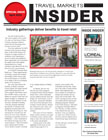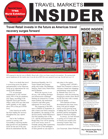The announcement last week that one of the largest airlines in the world, US-based Delta, had suddenly discontinued its duty free program with its inflight concessionaire, DFASS, has raised worrisome questions throughout the industry about the viability of inflight duty free.
The official statement released to TMI by Michael Thomas of Delta’s Corporate Communication Department was brief and to the point: “Delta has ended its onboard duty free program (effective Aug. 13) after the airline and its vendor were unable to agree on terms to continue to administer the program. “Delta apologizes for any inconvenience to our customers and as a reminder, a variety of duty free items are available at most international airports.”
Thomas told TMI that he was limited in what he could discuss, but did say that Delta is not exploring a replacement duty free vendor at this time.
As the world’s second largest airline, handling nearly 165 million passengers this year and codesharing with such leading carriers as Air France, KLM, GOL and Korean Air, Delta’s actions could impact decisions made by other airlines in the future. The Moodie Report brought up the point that the termination of the service may result in returns of unsold stock, a development that would directly affect suppliers.
Ivor Smith of Dutyfreeonarrival posted an indepth analysis, speculating whether Delta’s move would break the current inflight model. What was worse, asked Smith, that Delta “scrapped the sale of Duty Free goods on board,” or that the airline said it would not be replacing the service (at this time)? “They also cut the service at a stroke, removing carts, magazines and on-line links to their in-flight sales portal. The DFASS catalogue has also now disappeared from the web, within days,” said Smith.
He raises the question of whether the heavy duty free carts have outlasted their usefulness, and if the future will depend more on tablets (more efficient and economical?) than on magazines.
Is the system itself too complex? he asks. “Clearly, airlines will always need to sell physical products on board, such as food and drink, but perhaps the complicated movement of Duty Free merchandise, through suppliers, concessionaires, bonded warehouses and cabin crew is no longer a profitable exercise, especially, when some of the flight attendants do not wish to become sales assistants deriving little revenue from the practice.”
Moreover, inflight does not seem to have grown over the past few years. Generation Research reports that inflight duty free accounts for only about 7% of the global Duty Free market, a figure that has not shown much movement in year.
DFASS, meanwhile, continues to handle the inflight concessions for a broad, impressive portfolio of airlines, including American Airlines, Air Canada and Avianca in the Americas, among many others.
But the suspension of the Delta program is a situation that the industry will be watching carefully.
To see Ivor Smith’s full dutyfreeonarrival analysis, please go to arrivalsdutyfree.blogspot.co.uk









